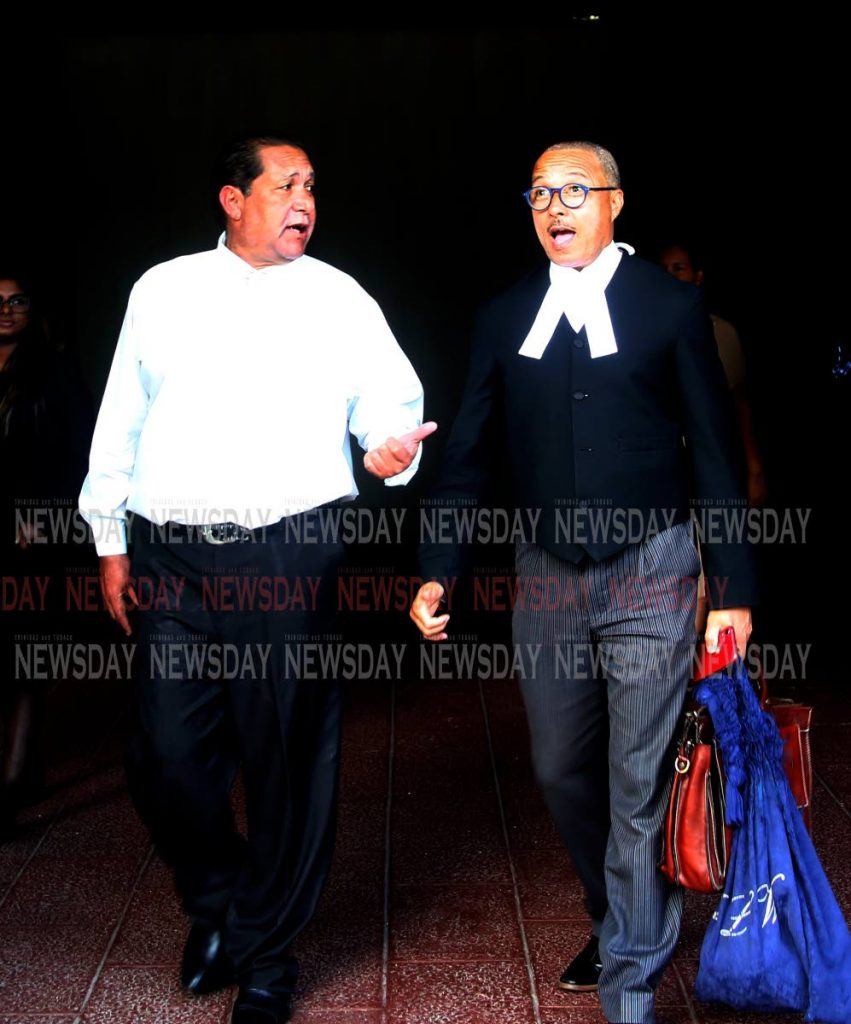Gocking found guilty in 18-year-old drug case

ALMOST 18 years after he was arrested for trafficking approximately $3.4 million worth in cocaine found in orange juice tins, Stephen Gocking has been convicted on two counts of drug trafficking.
On Wednesday, a jury deliberating for more than three hours returned guilty verdicts against Gocking, for possession, for the purpose of trafficking, a total of 206 orange juice tins which all contained a quantity of cocaine mixed with acetone.
Gocking was before Justice Maria Wilson at the Port of Spain Assizes, and he will be sentenced on September 25.
He is a cousin of brothers Clint and Troy Gocking who were fined $10 million for the illegal importation of two armoured Lincoln Navigator sports utility vehicles (SUVs) which were impounded by the State. He is also the nephew of Marlon Gocking, who was gunned down on Frederick Street, Port of Spain, in 2008.
Prosecutors Joy Balkaran and Shabana Shah presented evidence from police officers who raided Gocking’s apartment at Franklyn Road off Union Road, Four Roads, Diego Martin, where they found 45 orange juice tins containing the cocaine, and a solid block of cocaine, weighing 25 grammes, in the kitchen and 161 orange juice tins, which also contained cocaine and acetone, weighing 89 kilogrammes, found in the trunk of his wife’s SUV which he was using at that time.
Also testifying was a former scientific officer at the Forensic Science Centre, St James, who tested the drugs.
At the trial, the tins of Trinidad Juices orange juice were contained in cardboard boxes and the nine boxes as well as the block of cocaine and two metal tin sealers were tendered into evidence by Cpl Michael Charles, of the Organised Crime and Narcotics Unit (OCNU), who was one of the policemen who arrested Gocking.
In his testimony, Charles said he and other officers executed a search warrant at 2 Franklyn Road at about 8.30 pm. When they got to the house, a black SUV – PBA 274 – was in the yard and Gocking, who came to the front door, told him the vehicle was his wife’s and he used it to transport goods to his business place.
Charles said he looked in the SUV and saw several cardboard boxes in the trunk as well as cases of soft drinks.
A woman was in the house and she was identified as a friend of Gocking who was visiting. Charles said on searching the house there were several bottles of alcohol, including Johnnie Walker Gold, Asti Spumante, and Dom Perignon in one area of the house. In the bedroom, there were several empty metal cans without covers, glue, labels, can covers, Trinidad Juice labels and two metal objects Gocking allegedly told him was used to seal the covers onto the cans.
In the kitchen, Charles said in a cupboard he found two cardboard boxes, containing juice tins and he opened three of them with a knife. When he examined the contents, he said there was a liquid, which smelled like nail polish remover, and cocaine in the tins. Charles said he opened the remaining cans and they all contained the liquid and cocaine. He continued his search and found, in the cupboard where the boxes of cans were, a block of cocaine. Gocking, meanwhile, according to the officer, allegedly shook his head, inhaled, sighed and asked for his asthma medicine. Police also found 13 plastic bottles of acetone.
The police then went to the SUV where seven cardboard boxes with juice tins were allegedly discovered. Charles said he randomly opened a few tins and they all had the same contents as those found inside the house.
At the trial, the defence attempted to discredit the police officers, particularly Charles. Gocking’s attorney Larry Williams challenged Charles on his evidence pertaining to the weight of the tins allegedly found by police during a search of the house; of alleged utterances made by Gocking; and his occupation of the house.
Gocking also testified at his trial, claiming the apartment at Franklyn Road was his half-uncle Marlon’s and he was there “for a romantic interlude” with a young woman who was not his wife.
He said he went there to meet a young lady for an hour and made arrangements with Marlon to use the apartment for an hour.
The woman, he admitted, was not his wife and he took her to the apartment because he “certainly could not take her to my apartment where my life lived.”
Gocking lived with his wife and mother at Apt 303, Building C, Powder Magazine, Diego Martin. He still lives there.
“I went there (the Franklyn Road apartment) purely for a romantic interlude,” he said.
He said if everything had worked out, he would have left Marlon’s apartment after the hour and gone his way. “Time was of essence,” he added.
His “romantic interlude” with the woman only lasted as long as it took for him to remove his shirt as the police stormed the apartment five minutes after he got there. He first thought his wife had sent people for him.
He denied all the claims made by the police who arrested him and who said they found the cocaine in the apartment and his wife’s car.
Gocking said when police entered the apartment, they had their guns pointed at him and were aggressive. “I get choopid,” he said, and at the time the only thing going through his mind was: “What am I going to tell my wife.”
He said he decided to stay quiet. While admitting that the vehicle that was in the yard of the apartment was his wife’s, Gocking said there were no boxes in it, despite police saying they found seven boxes which contained juice tins filled with cocaine and acetone.
Attorney Shaun Morris also represented Gocking.


Comments
"Gocking found guilty in 18-year-old drug case"